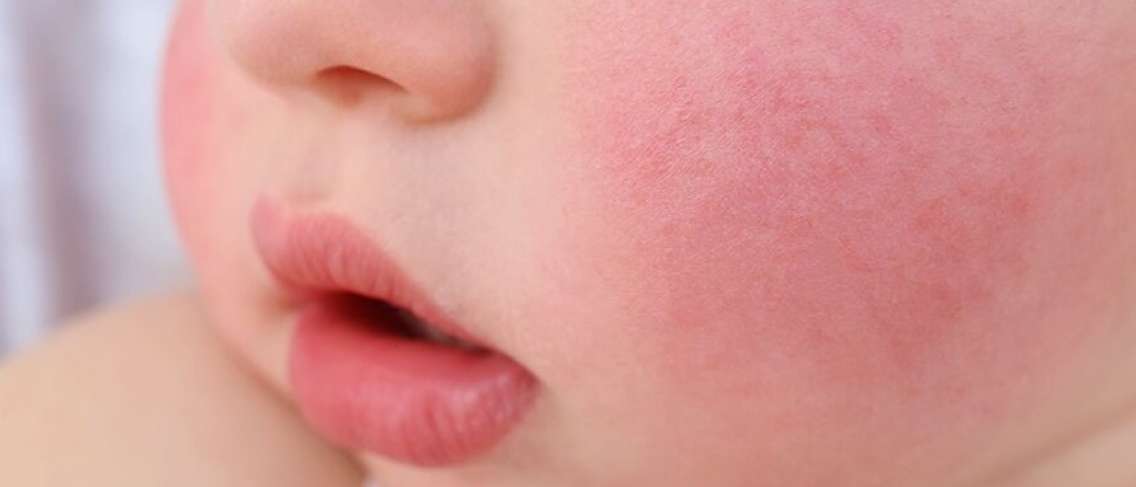If you pay close attention, you may notice that some babies naturally have cheeks that are redder than the rest of the face. The cheeks may also turn red when the baby cries or smiles, due to increased blood flow to the area.
However, if this redness seems unnatural or persists for a long time, it may be an indication of a health problem. For this reason, it’s good for you to be careful and find out what causes the redness of the baby’s cheeks.
Causes of Red Cheeks in Babies
Several conditions can cause a baby’s cheeks to appear red. It is important to note that redness is usually more pronounced in babies with fair skin and may be more difficult to detect in babies with dark skin. Here are some possible causes of red cheeks:
1. Fifth disease
Red cheeks are most often associated with a virus called fifth disease. In addition to flushed cheeks, some children will also show other symptoms, such as low-grade fever, runny nose, nausea, vomiting, or diarrhea.
Your child may also get a rash on other parts of the body, especially the chest and neck, but this usually goes away on its own in a few days. Fifth disease is a fairly mild disease, especially in infants and children. However, if this causes your child to become cranky due to discomfort, make sure your little one gets enough rest and is well hydrated.
2. Teething
It is very common for babies to get a rash on the cheeks while teething. This rash occurs because the baby’s mouth is drooling constantly, causing a lot of saliva to dry on his cheeks.
A red rash from teething usually appears around the mouth, chin, neck, cheeks and may smell like food or milk. In addition, teething babies may become more fussy, have trouble sleeping, and like to bite.
3. Chapped skin
Dry and cold air can cause the skin to become dry and irritated, which then appears cracked and red. Cold redness looks similar to a rash from teething.
Cheeks and lips are parts of the skin that are more prone to chapping. However, any area of skin exposed to cold air can also become chapped. Babies with eczema or dry skin are also more prone to this.
Chapped skin is not a dangerous condition, but it can cause itching. You can help your little one relieve discomfort by frequently applying moisturizer to the affected area.
4. Eczema
Eczema can appear as crusty, scaly patches on the baby’s skin. Eczema is more common in babies a few months old and is generally not a cause for concern.
Eczema can look different between babies. In babies with fair skin, it usually appears as reddish patches. Meanwhile, in dark-skinned babies, the rash looks purplish or gray. The patches also usually appear dry, rough, and itchy. Eczema most often appears on the cheeks and the joints of the arms and legs.
5. Skin infections
When bacteria or other harmful pathogens enter the skin and multiply, it can trigger an infection. Infection usually occurs when the baby has an injury, such as from a scratch, injury, dry or cracked skin.
One type of skin infection, cellulitis, affects the deeper layers of the skin. This can trigger redness and swelling. Sometimes, the rash is accompanied by red streaks. Redness due to infection usually occurs on one side of the cheek, but it is still possible to get the infection on both cheeks.
How to Overcome Red Cheeks
Treatment for red cheeks depends on the cause:
- If the cause is fifth disease, The redness will usually go away on its own.
- If the cause is eczema, the redness may not go away in a short time. In this case, you should try to find out if your little one might be exposed to allergies. In addition, applying moisturizer can also help minimize patches and dry skin.
- Mums can’t deal with flushed cheeks from teething. However, you can help relieve gum discomfort, such as by giving certain foods.
Often times, the redness of a baby’s cheeks is nothing to worry about. However, if the redness does not go away, spreads, or causes discomfort to the baby, it is important to consult a pediatrician.
Source:
https://www.peanut-app.io/blog/baby-red-cheeks
https://www.medicalnewstoday.com/articles/rosy-cheeks-baby#outlook
https://www.webmd.com/parenting/baby/baby-eczema-questions-answers
–


